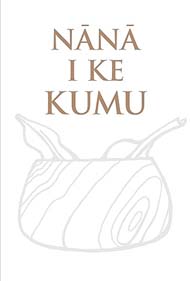Nānā I Ke Kumu
Hele 'Ekolu (Volume 3)
Lynette K. Paglinawan, Richard Likeke Paglinawan, Dennis Kauahi, Valli Kalei Kanuha
Published by Lili'uokalani Trust, 2020
This third volume of Nānā i ke Kumu presents ancient
and fundamental Hawaiian values and traditions associated
with grieving and healing practices with the goal
of addressing modern-day family conflicts, including
drug addiction, abandonment, divorce, incarceration,
and domestic violence. This book is intended to inspire
those who work with Hawaiian families as well as
individuals - teachers, clergy, medical practitioners, social
workers, law enforcement, and community leaders.
It will empower individuals who seek to integrate a more
meaningful understanding of Hawaiian beliefs into their
lives. The authors have strived to represent the collective
mana'o of Tūtū Pukui and their respective kūpuna, and
the individuals with whom they have worked for decades.
In the 1970s, Hui Hānai published Nānā i ke Kumu helu 'ekahi and 'elua (Pukui, Haertig, and Lee,
1972 and 1979, respectively), which illustrated the value of our Hawaiian ancestor's inherent
collective wisdom and demonstrated its modern-day relevance. These publications have served
as the inspiration and mo'okū'auhau for Nānā i ke Kumu helu 'ekolu.
Lynette and Richard Paglinawan were hired in the
1960s by Lili'uokalini Trust as social workers to help Hawaiian
children and their families. Encountering cases involving 'anai
(spell or curse) and moe'uhane (dream), they felt ill prepared
to deal with these complex, distinctly Hawaiian problems.
Mentored by Mary Kawena Pukui, they learned to differentiate
between situations that are rooted in Hawaiian concepts
and require Hawaiian solutions; and situations that stem from
profound historical trauma, (reaching as far back as the arrival
of European and Britisch explorers in the eighteenth century),
and require solutions that draw upon Western social work
practices. From Pukui, Richard and Lynette learned about
ho'oponopono and the potential of its application to social
work, ultimately training to become haku ho'oponopono.
Dennis Kauahi's career at Lili'uokalani Trust spanned forty years in roles including social worker,
supervisor, and assistant director. He retired in 2018. A master practitioner of ho'oponopono,
he credits na kupuna Mary Kawena Pukui, Nahale'elua Mahuiki, Malia Craver, and Danny Hanakahi as his mentors.
Born and raised on Kaua'i, his grounding in Hawaiian language and culture prepared him to provide culturally
based social work to a wide range of families and communities based on mutual respect and trust, and to establish
personal and professional connections with indigenous peoples worldwide.
Valli Kalei Kanuha was born and raised in Hilo, Hawai'i. She thanks her grandmother,
Becky Niniauokealohaonawaaholoeluaokalani Arce Kanuha, and her mother, Chitose Araki Kanuha, for their unconditional love.
Aunty Malia Craver honored Kalei with her blessing to work on this sacred project, for which Kalei will be forever grateful.
Kalei currently serves as assistant dean, Office of Field Education, University of Washington, School of Social Work.
This volume features the work of esteemed Native Hawaiian artist Imaikalani Kalahele, a scholar and practitioner
of Hawaiian culture who lives and works in his mountain studio in upper Kalihi Valley.
(The text above comes from the inside flaps of the book)
Richard Paglinawan was named a Living Treasure of Hawaii
by the Buddhist Honpa Hongwanji Mission of Hawaii in 2006, see:
HongwanjiHawaii.com and
Wikipedia.
Lynette Paglinawan was named a Living Treasure of Hawaii
by the Buddhist Honpa Hongwanji Mission of Hawaii in 2012, see:
HongwanjiHawaii.com and
Westoahu.Hawaii.edu
Dennis Kauahi was named a Living Treasure of Hawaii
by the Buddhist Honpa Hongwanji Mission of Hawaii in 2013, see:
HongwanjiHawaii.com and
Wikipedia.
Interview with all the authors of this book: YouTube.
Review
Comprehensive study of Hawaiian traditions written by Hawaiians, an invaluable source!
The last chapter 4 (page 75-99) focusses on ho'oponopono; the structure, the different parts such as the opening,
naming the problem, analyzing the problem as it lives with everyone, self-examination, confession, showing remorse,
asking forgiveness, followed by a closing ritual. Ho'oponopono is the sum of these parts, the parts separately are not ho'oponopono,
we read on page 98.
"Any discussion, application, teaching, or even mention of the term that does not ground
itself first and foremost in Hawaiian culture, as taught and mentored by a Hawaiian practitioner of ho'oponopono, is a
misappropriation and exploitation" (page 77).
This book is a must-read if you want to delve into Hawaiian traditions, such as Ho'oponopono.
And, there are no mantra's in this book!
Martin



